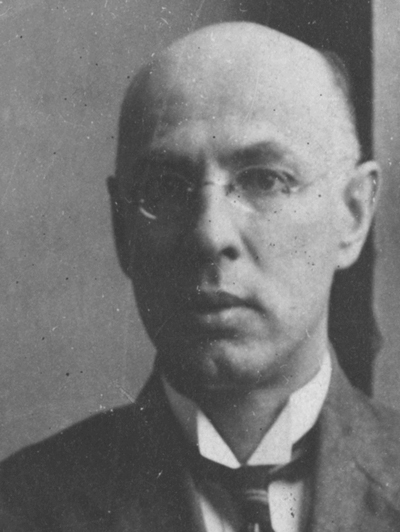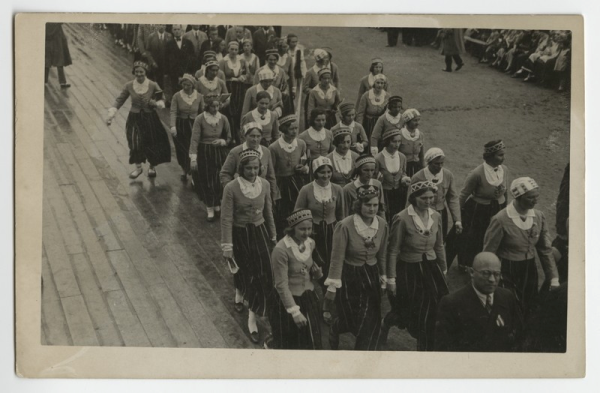Ernests Brusubārdis I
1880-1968
Choir conductor, music critic, composer
Ernests Brusubarda (in other sources also Brusubardis (Brusubārdis)) was born on 5 August 1880 at Anuzi house in Arlava into a family of farmers. His father was Reinis Brusubardis (Reinis Brusubārdis), his mother - Sofija Liene (née Karlovica), his sister - Marija. He started his school career at the Talsi City School and developed his musical talents with teacher Berzkalns (Bērzkalns) in Talsi where he learnt to play the violin. In his youth, he began medical studies in Moscow but soon changed his interest in medicine to music. In St. Petersburg (1910-1916) he studied violin and organ with Jacques Handschin as well as solo singing, music theory, and history. As early as 1909, Brusubarda began his career as a music reviewer for the Baltic Journal, and until the First World War he also wrote for the newspaper “Latvija”, continuing his work as a music critic until the 1960s.
After graduating from the Conservatoire, Brusubarda fully integrated into Latvian cultural life. From 1919 to 1940 he worked for the newspaper “Jaunakas zinas”, wrote music reviews and founded the newspaper's staff choir. The choir later adopted the conductor's name as its name, calling themselves the Brusubarda Choir. As a music critic, he was also active in the National Opera Directorate and the Latvian Art Agency, of which he was one of the founders, as well as in other institutions and positions in Riga in the 1920s and 1930s. In the late 1930s, Brusubarda and his wife Erna moved from Riga to his childhood home Anuzi and took over the management of Arlava Choir. The choir had 50 members from near and far. Together with the charismatic conductor, the choir became increasingly successful and toured widely. In 1935, Brusubarda received the Order of the Three Stars, V Rank.
In 1944, the Brusubarda family emigrated to Germany and initially lived in the Alt-Garge camp. As the war subsided, the conductor resumed the Brusubarda Choir and by 1945 was giving concerts to his compatriots in the camp as well as to American soldiers and German audiences. On 27 October 1946, he was the chief conductor at the Latvian Song Day of the Greater Hessen District in Hanau am Main (Hanau District Latvian Song Day). Later, after moving to Milwaukee in the USA in 1952, the choir was re-established. The new choir had 76 applicants and sang for the first time in 1952 at the Latvian State Foundation Day service. Brusubarda gave annual concerts with the choir, took part in song festivals in Canada, the USA, Germany, Gotland, Sweden, and was himself the chief conductor of several of these festivals, including the 5th Song Festival in the USA, Cleveland, in 1973. When the choir merged with another American Latvian choir "Dzimtene", it was renamed The United Ernests Brusubarda - Dzimtene Choir. In 1965, the conductor came in front of his choir for the last time to bid his farewell and handed over the reins of future leadership to his son, Ernests Brusubarda II (Ernests Brusubārda II).
While in emigration, Brusubarda continued to write for the Latvian newspaper “Laiks”. He also composed relentlessly, adding more than a hundred new works to the number of his compositions in exile: solo songs, choral songs, piano, violin, and string ensemble music. Brusubarda passed away on 23 April 1968 at the age of 88 after a week-long battle with illness in hospital. In 1990, a memorial room was opened in Brusubarda’s birthplace Anuzi in Latvia.
Information sources
Č[aks], R. (1965, 28. augusts). Mūzikas vērtētāja mūža veikums. Laiks, 69, 3. Laiks, Nr.69 (28.08.1965) (periodika.lv)
Čaks, R. (1968, 1. maijs). Miris Ernests Brusubārda. Laiks, 35, 5. Laiks, Nr.35 (01.05.1968) (periodika.lv)
Milvoku Apvienotais Brusubārdas Dzimtenes koris. (b.g.). https://www.latviansongfestfund.com/milvoku-apvienotais-brusubardas-dzimtenes-koris/
P., E. (1990, 1. septembris). Dir. Ernesta Brusubārdas piemiņas istaba Latvijā. Laiks, 70, 3. Laiks, Nr.70 (01.09.1990) (periodika.lv)



